Harmless or dangerous? We will tell you which 10 plants you should stay away from when you are expecting a child.

Having a child is probably the greatest happiness on earth. But suddenly you are confronted with completely new challenges. What was commonplace before the pregnancy suddenly raises questions: Am I even allowed to do that or should I rather not do it? At least in terms of plants we can give you some information. We show you ten common garden plants that you should avoid during pregnancy.
contents
- aloe vera
- basil
- mugwort
- Comfrey
- barberry
- pasqueflower
- mistletoe
- feverfew
- juniper
- cinammon
NOTICE: Many of the plants listed below only have a harmful effect in high doses. Basically, side effects CAN occur, but do not HAVE to. If you are unsure whether the plant is safe to consume, please consult your doctor or pharmacist.
As already mentioned, we do not want to make pregnant women feel insecure, but rather encourage them to eat lots of fresh vegetables and fruit. If in doubt, please always consult your doctor.
aloe vera
The aloe vera (aloe vera) is best known as an ingredient in numerous care products, but is also found as a potted plant in many homes. However, the plant is not suitable for pregnant women. When drunk as a juice or tincture, the plant can have a laxative effect, dissolve toxins or lead to contractions as they allow for increased accumulation of blood in the abdominal organs cares. However, the symptoms mentioned usually only occur if larger quantities are taken. External use, on the other hand, is more than unproblematic - in fact, aloe vera can even help against stretch marks.

basil
Tomato, mozzarella and basil – a real treat, especially in summer. But what about pregnancy? In normal amounts, basil is (Ocimum basilicum) is completely harmless and can also be eaten by pregnant women without any problems. Basil's essential oils, which have a labor-inducing effect, are present in small amounts in the leaves, so a regular serving has no effect whatsoever. On the other hand, the use of basil oil is viewed critically: In this, the essential oils of the basil are clear more concentrated, so it should not be taken during pregnancy to prevent premature labour avoid.
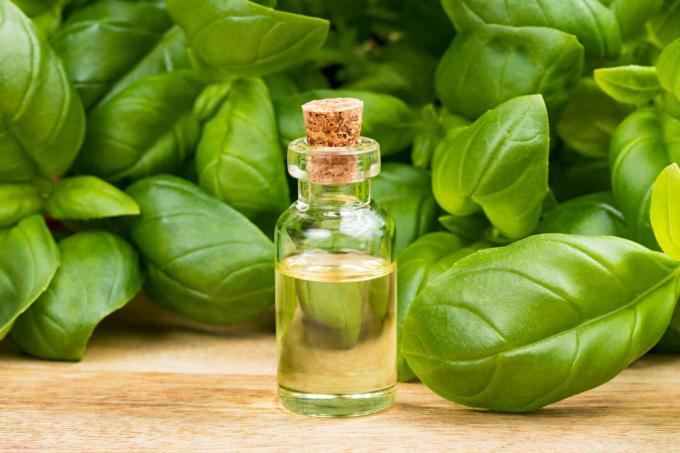
mugwort
Broomweed, lady's weed or wild wormwood - the mugwort (Artemisia vulgaris) has many names and is still often used as a spice plant for heavy meat dishes. Mugwort tea, in particular, used to be used to treat menstrual pain. If you are expecting a child, however, you should avoid mugwort: mugwort can have an abortifacient effect due to its menstrual-promoting properties. In a dosage that is usual for spices, however, it is widely considered harmless.

Comfrey
As a traditional medicinal plant Comfrey (Symptom officinale) known since the Middle Ages. It has an anti-inflammatory, pain-relieving and decongestant effect and is often used for external application. However, comfrey has so-called pyrrolizidine alkaloids, which have a toxic, liver-damaging effect. Pregnant and breastfeeding women in particular should therefore refrain from eating and using comfrey, as children and fetuses are much more sensitive to the toxins.

barberry
Tasty vitamin C bomb – the barberry (Berberis vulgaris) or sour thorn is not only delicious as a jam, but also very healthy. Even if the shrub actually comes from Africa, the barberry is also widespread here, after all, the fruits not only taste good, the barberry also flowers beautifully. Nevertheless, women with a child under the heart should refrain from eating the red berries. While berberine, which in high doses can induce preterm labor and stimulate bleeding, mainly found in the twigs and leaves, but traces can also be found in the fruit occurrence.
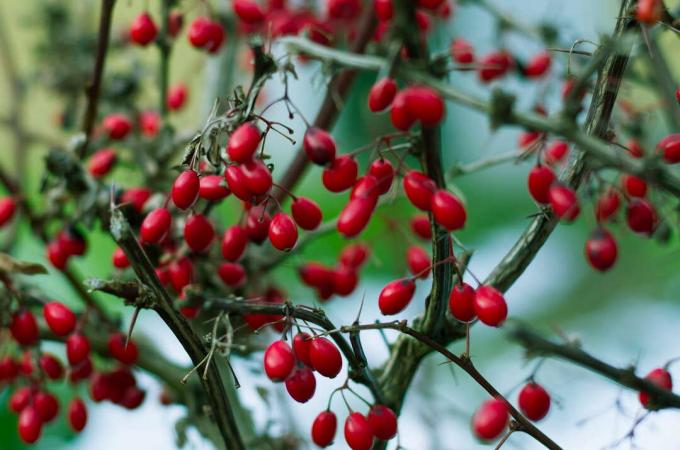
pasqueflower
The pasque flower (Pulsatilla vulgaris) is a pretty spring plant with large flowers. It used to be a well-known medicinal plant, but today pasque flowers are only used in homeopathy, for example to treat colds or rheumatism. However, the pasque flower has no place in the kitchen, as it has a poisonous effect when fresh. Pregnant women should not use the pasqueflower either: the plant promotes menstruation and can cause a miscarriage, especially in the first trimester of pregnancy.
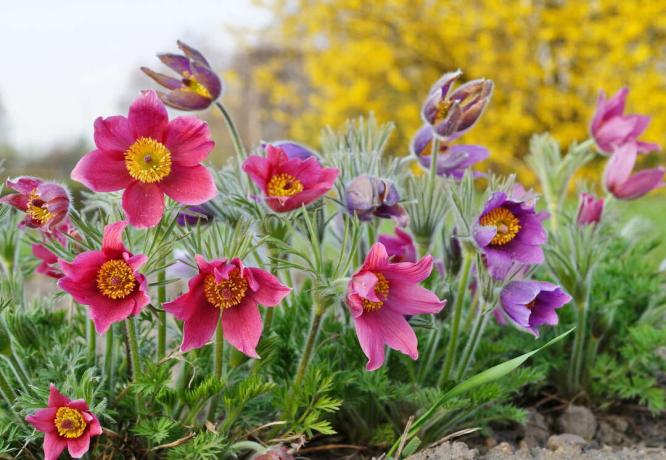
mistletoe
If you stand under a mistletoe, you have to kiss - at least that's what the custom demands. But the mistletoe (Viscum) is more than just a nice decoration. It is traditionally used to support the cardiovascular system and is still used today in cancer therapy. However, mistletoe only belongs in experienced hands, as it has a toxic effect. Pregnant women should also not use mistletoe under any circumstances: its active ingredients migrate into the placenta and can lead to developmental disorders in the child. In this article you will find six exciting questions and answers on the subject mistletoe.
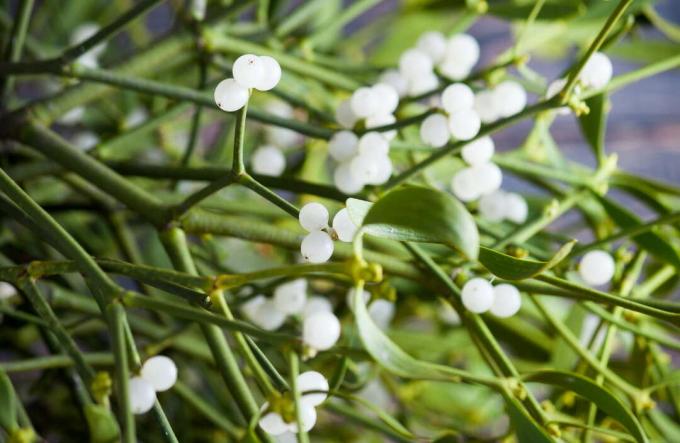
feverfew
That has almost been forgotten feverfew (Chrysanthemum parthenium), a plant that looks very similar to our chamomile. Feverfew used to be a sought-after remedy for all sorts of women's ailments, from period cramps to menopause. However, the plant owes its name to its use during pregnancy: During childbirth, it promotes labor and helps expel the afterbirth. Nevertheless, pregnant women should not take the plant - especially in the first trimester, the menstrual bleeding effect of the plant can lead to miscarriage.
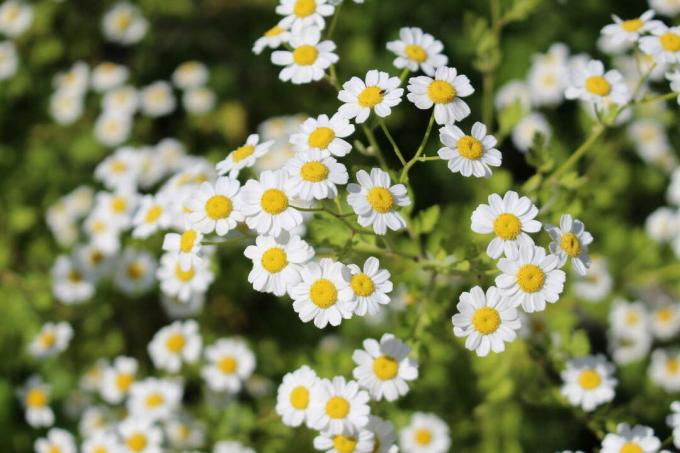
juniper
In hearty dishes or as a schnapps – Common juniper (Juniperus communis) has long since found its place in our kitchens. The dark berries in particular can be used in many ways and are a real treat for the palate. However, pregnant women should not use too large amounts of the kitchen spice: juniper can have a stimulating effect on the uterus. Juniper should therefore not be used in concentrated oils or tea. There is nothing wrong with a bit of spice in the stew.

cinammon
Cinnamon is a must, especially at Christmas time. The spice, which is obtained from the bark of various types of cinnamon tree, is simply delicious. But many warn against using it during pregnancy. The reason: cinnamon has an antispasmodic effect and can thus stimulate labour. However, the usual amounts of cinnamon in pastries or as a spice are completely unproblematic. Pregnant women should therefore only refrain from excessive consumption of cinnamon. Cinnamon capsules or cinnamon oil should also not be taken. A single cinnamon star is absolutely unproblematic.

If you prefer not to take any risks when choosing plants for your garden, here is a list of non-toxic and absolute child and animal safe plants.
...and receive concentrated plant knowledge and inspiration directly in your e-mail inbox every Sunday!



